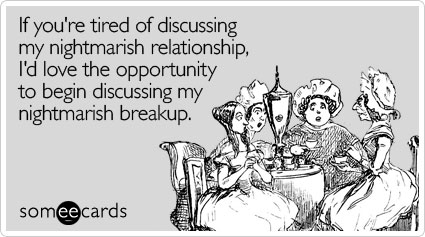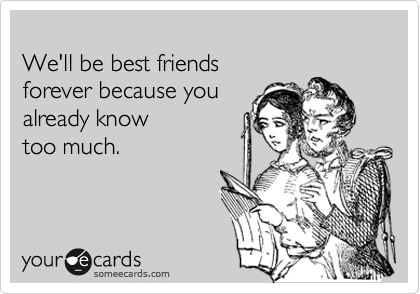
Earlier this week, I wrote about the 9 best ways to sabotage a relationship. “Nicole,” you may be thinking, “How can I make sure that I'm not the jerk in my relationship(s)?” Most of these suggestions are applicable to all relationships, whether it be with a co-worker, friend, parent or partner. There is one that applies primarily to romantic relationships but just in case it's not obvious, I'll put an asterisk* next to it...some of us may have different kinds of friends!
The 6 Cs of keeping your relationship(s) healthy and happy:
1. Communication – this is HUGE in maintaining all relationships. Many of us believe that it's up to our loved ones to read our minds and be able to decipher our words – both the stated and unstated. While it's wonderful to feel like someone truly understands us and can figure out what we want without saying it, it's almost impossible to find someone who can do that all the time about everything. If something bothers us, it's important to speak up and let the other person know. It's also important to keep in mind how we communicate. If we communicate in a way that is accusatory, self-righteous or judgmental, often the message gets lost in the delivery. There's a huge difference between “It bothers me when you drink the last of the wine and don't replace it,” and “You're such a selfish bastard! You always drink all the wine and never buy any to replace it.”
2. Conscientious listening – actually, listening (yeah, I took some creative license with this one) is a part of communicating, but we often forget to do it, so it gets its own space. When we truly listen to each other, there is a lot of information we can gather, whether it's being communicated to us directly or indirectly. For example, I once dated someone who stated that their ex never dressed femininely. Although they were not telling me specifically to look more girlie, I got the message...and I wore a lot of dresses.
1. Communication – this is HUGE in maintaining all relationships. Many of us believe that it's up to our loved ones to read our minds and be able to decipher our words – both the stated and unstated. While it's wonderful to feel like someone truly understands us and can figure out what we want without saying it, it's almost impossible to find someone who can do that all the time about everything. If something bothers us, it's important to speak up and let the other person know. It's also important to keep in mind how we communicate. If we communicate in a way that is accusatory, self-righteous or judgmental, often the message gets lost in the delivery. There's a huge difference between “It bothers me when you drink the last of the wine and don't replace it,” and “You're such a selfish bastard! You always drink all the wine and never buy any to replace it.”
2. Conscientious listening – actually, listening (yeah, I took some creative license with this one) is a part of communicating, but we often forget to do it, so it gets its own space. When we truly listen to each other, there is a lot of information we can gather, whether it's being communicated to us directly or indirectly. For example, I once dated someone who stated that their ex never dressed femininely. Although they were not telling me specifically to look more girlie, I got the message...and I wore a lot of dresses.
3. Compromise – I know it's hard to believe, but it's not all about us. Being in a relationship involves another person and we sometimes have to do things we don't want or like for the good of the relationship. For example, your boss may like for your expense report to be done by first the Monday of the month, even though it doesn't need to go to accounting until the 10th. Your natural tendency is to procrastinate, but because you want to continue to have a positive relationship with your boss, you make sure to get it in the first Monday – even if it means working on it at home on the Sunday night before. A little bit of compromise goes a long way and it feels good to bring the people in our lives a little bit of happiness; it's often the little things that mean the most.
4. Consideration – when we feel hurt or angry, it's very easy to believe that our loved one has engaged in the offending behavior intentionally. Unless the behavior is blatantly egregious (ie. sleeping with your partner, stealing money, spreading lies about you, etc.), the majority of the time, our loved one may not be aware that their behavior was so offensive to us. If this is someone we love, shouldn't we give them the benefit of the doubt? If it's something we've communicated many times and they continue to do it, then maybe our anger and hurt is well deserved. However, if this is a first-time offense, let's cut them some slack. What if the shoe was on the other foot? I'd want to be given the benefit of the doubt.
5. Compliments – it's so easy to take for granted that the people in our lives know how awesome we think they are. Why not remind them every now and again? A random "You're so beautiful/smart/handsome/sexy," can make someone's day (depending on the relationship of course - don't tell your boss you think they're sexy!). Or you can focus on something more unique such as "You have great forearms" or "You do such a great Gary Coleman impression." We all respond positively to praise and it feels just as good to give a compliment as it does to receive one. It's also a terrific way to motivate people to continue to do the things you like.
6. *Copulation – sex, nookie, getting some, love-making, doing it, whatever you want to call it. Some of you might hate me for saying this, but for most people, sex is incredibly important in a romantic relationship, whether you're gay, straight, left, right, round or square. We all have an idea of what is an acceptable amount of sex and there might be a bit of compromise between us and our partner(s). However, sex or lack thereof, can be a good indicator that something may not be quite right in our relationship. Yes, there is an ebb and flow to the amount depending on varying circumstances but if it seems like there's more ebb than usual, it may be time to check in with our partner. They just might not be turned on by us clipping our toenails in the bed. Who knew?!
I hope these suggestions are helpful, especially if you're trying to prevent your relationship(s) from expiring. But if you're really working toward getting de-friended on Facebook, avoid these suggestions at all costs and I'm sure your endeavor will be successful. :)





